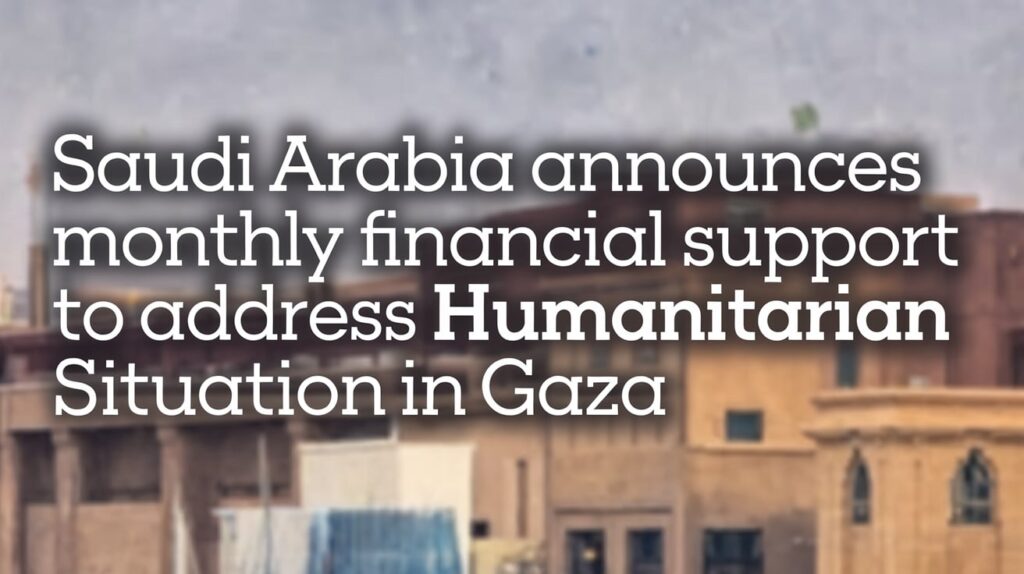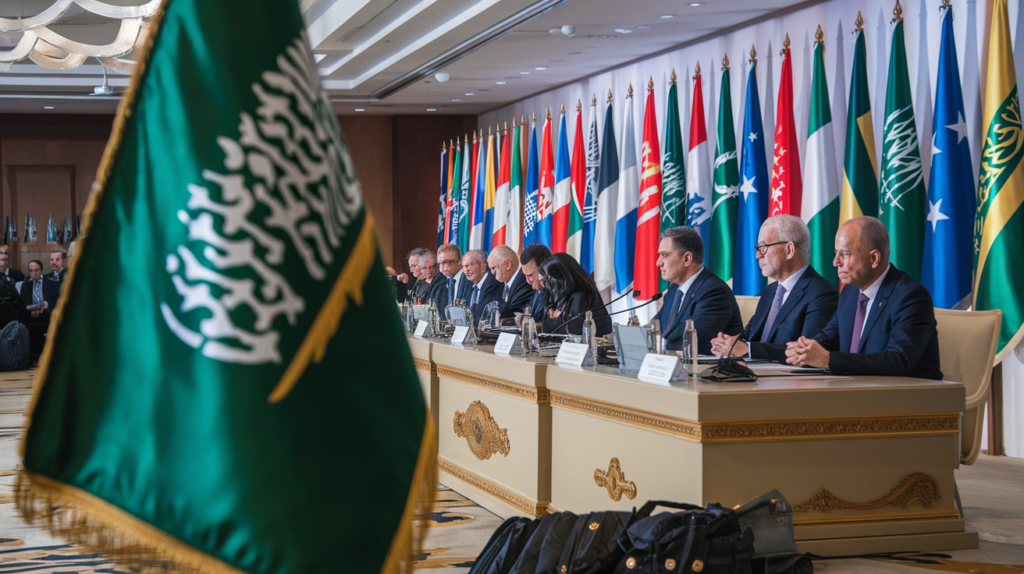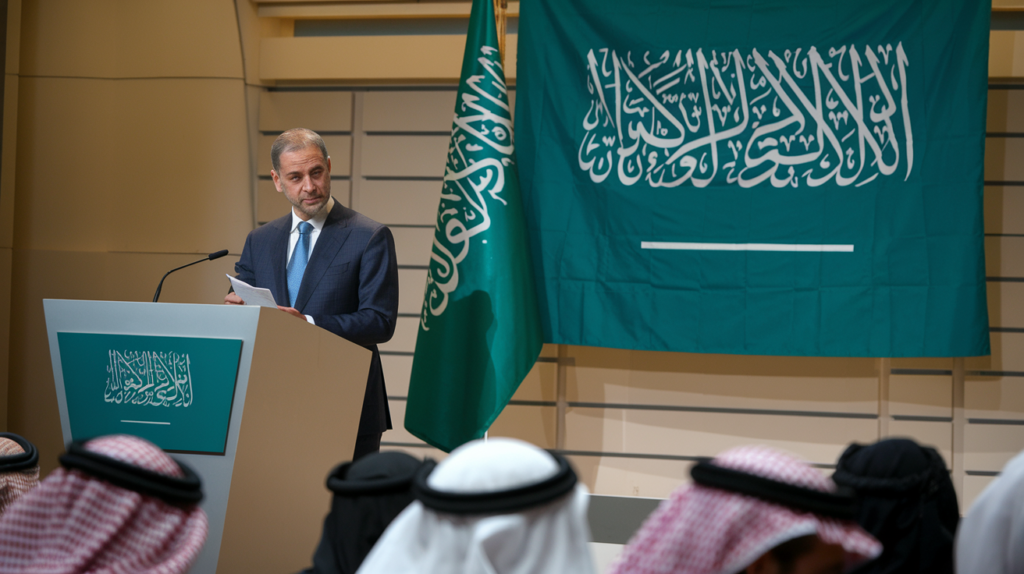Saudi Arabia Announces Monthly Financial Support to Address Humanitarian Situation in Gaza
Saudi Arabia has recently announced a significant move to address the ongoing humanitarian crisis in Gaza. As conflicts continue to plague the region, Saudi Arabia’s pledge of monthly financial support aims to provide much-needed aid to the Palestinian people. This decision reflects Saudi Arabia’s commitment to playing a key role in providing humanitarian relief and highlights its responsibility as a major player in the Middle East.
In this article, we will explore the details of this financial support, the reasons behind Saudi Arabia’s initiative, the current humanitarian situation in Gaza, and what this aid could mean for the future of the region.

1. The Announcement: Saudi Arabia’s Pledge for Gaza
Saudi Arabia’s decision to provide monthly financial support for Gaza comes at a crucial time. As violence in the region continues, Gaza’s residents have been struggling with limited access to basic necessities, including food, water, medical supplies, and electricity. The ongoing conflict between Israel and Palestinian groups has led to a worsening humanitarian crisis, which has drawn the attention of international organizations and governments worldwide.
By providing monthly financial aid, Saudi Arabia hopes to ease the suffering of Gaza’s people and ensure that humanitarian organizations have the resources needed to offer emergency services. While exact figures have not yet been publicly disclosed, it is expected that this monthly support will cover essential needs such as healthcare, education, and infrastructure repair.
This support is part of Saudi Arabia’s broader efforts to help the Palestinian cause and show solidarity with the Palestinian people. Over the years, Saudi Arabia has consistently supported Palestine, whether through financial contributions or diplomatic efforts.

2. The Humanitarian Situation in Gaza
Gaza is one of the most densely populated areas in the world, home to over two million people living within a small coastal strip. Over the last few decades, the region has faced numerous conflicts, which have resulted in widespread destruction, loss of life, and a deteriorating quality of life for its inhabitants.
The current humanitarian crisis in Gaza is severe. People lack access to basic services, and many live in constant fear due to the ongoing violence. According to humanitarian organizations, the situation has reached a point where nearly every aspect of life has been affected. Some of the main challenges include:
- Food and Water Shortages: Gaza’s residents face frequent shortages of food and clean drinking water. The destruction of infrastructure has made it difficult to provide consistent access to these basic necessities.
- Healthcare Crisis: Medical facilities are struggling to keep up with the increasing number of casualties and injuries. Many hospitals and clinics are understaffed and lack critical supplies, making it difficult for doctors to provide adequate care to those in need.
- Electricity and Fuel: Gaza’s electricity supply is extremely limited, with residents receiving only a few hours of power each day. This has further impacted essential services such as hospitals, schools, and water treatment plants.
- Displacement: Thousands of people in Gaza have been displaced from their homes due to the violence, forcing many families to seek refuge in temporary shelters that lack adequate facilities.
These challenges have made daily life extremely difficult for the people of Gaza. Humanitarian organizations such as the United Nations and the Red Cross have been providing emergency relief, but the scale of the crisis requires more resources and long-term support.
3. Why Saudi Arabia is Providing Financial Support
Saudi Arabia has long been a supporter of Palestine, and its decision to provide monthly financial support to Gaza is part of its ongoing commitment to help address the region’s issues. There are several reasons why Saudi Arabia has taken this step:
a) Humanitarian Responsibility
Saudi Arabia recognizes its role as a regional leader and the need to step up during times of crisis. The kingdom has a history of providing aid to conflict-affected areas, and this latest move underscores its commitment to supporting those in need. By offering monthly financial assistance, Saudi Arabia aims to help ease the humanitarian burden in Gaza and ensure that basic services such as healthcare, education, and food security are maintained.
b) Political and Diplomatic Interests
Saudi Arabia has consistently supported the Palestinian cause in international forums and has called for a peaceful resolution to the Israeli-Palestinian conflict. By providing financial support to Gaza, the kingdom is sending a message of solidarity with the Palestinian people while maintaining its stance on the need for a two-state solution. Saudi Arabia’s support can also strengthen its diplomatic position in the region and among other Arab nations that stand with Palestine.

c) Maintaining Stability in the Region
The ongoing conflict in Gaza has the potential to destabilize the entire region. Saudi Arabia understands that addressing the humanitarian crisis is crucial not only for the people of Gaza but also for maintaining stability in the Middle East. By offering financial aid, Saudi Arabia hopes to reduce tensions and alleviate some of the suffering that could lead to further unrest.
d) Religious and Cultural Bonds
Saudi Arabia is home to two of Islam’s holiest sites, Mecca and Medina, and holds a special place in the hearts of Muslims around the world. Many people in Gaza are Muslim, and Saudi Arabia’s decision to support them is seen as part of its religious and cultural responsibility. The kingdom has often provided aid to Muslim communities facing hardship, and this latest initiative aligns with its broader charitable efforts.
4. What the Financial Support Will Be Used For
The monthly financial aid provided by Saudi Arabia is expected to be used for a variety of purposes aimed at improving the quality of life for Gaza’s residents. Some of the key areas where this funding will likely be allocated include:
a) Healthcare Services
As mentioned earlier, Gaza’s healthcare system is under immense strain. Hospitals and clinics are overwhelmed with patients, and many lack the necessary equipment and medicines to treat injuries and illnesses. Saudi Arabia’s financial support will likely be used to purchase medical supplies, provide salaries for healthcare workers, and help rebuild damaged healthcare facilities.
b) Food and Water Assistance
One of the most pressing issues in Gaza is the shortage of food and clean water. The destruction of agricultural lands, combined with restrictions on imports, has made it difficult for residents to access adequate nutrition. Saudi Arabia’s aid will be used to provide food assistance programs, improve water distribution systems, and repair damaged infrastructure.
c) Education
Education is vital for the future of Gaza’s children, but many schools have been destroyed or are functioning with limited resources. Saudi Arabia’s financial support will help rebuild schools, provide learning materials, and pay teachers’ salaries to ensure that children can continue their education even during times of crisis.
d) Reconstruction of Infrastructure
Gaza’s infrastructure has suffered extensive damage due to the ongoing conflict, with roads, bridges, and buildings destroyed. Saudi Arabia’s monthly financial aid will help rebuild key infrastructure such as roads, power plants, and water treatment facilities, which are crucial for the region’s long-term stability and recovery.
e) Support for Displaced Families
Many families in Gaza have been displaced due to the violence, forcing them to live in overcrowded shelters or with relatives. Saudi Arabia’s financial assistance will help provide temporary housing and support for these families, ensuring they have access to basic necessities like shelter, food, and healthcare.
5. International Reactions to Saudi Arabia’s Aid Initiative
Saudi Arabia’s decision to provide monthly financial support to Gaza has been met with widespread approval from various international organizations and governments. Humanitarian groups have welcomed the initiative, noting that additional resources are desperately needed to address the crisis. The United Nations and other relief agencies are likely to collaborate with Saudi Arabia to ensure that the aid reaches those who need it most.
Other Arab nations have also expressed their support for Saudi Arabia’s efforts, with some considering similar initiatives to provide aid to Gaza. This shows a growing sense of unity among Arab countries in supporting the Palestinian cause and addressing the humanitarian challenges in Gaza.
However, there are also some concerns about how the aid will be distributed and whether it will reach the intended recipients. In conflict zones like Gaza, ensuring that aid is used effectively and does not fall into the wrong hands can be challenging. Saudi Arabia is expected to work closely with international aid organizations to ensure transparency and accountability in the distribution of funds.
6. What This Means for the Future of Gaza
Saudi Arabia’s financial support could have a significant impact on the future of Gaza. By providing monthly aid, the kingdom is helping to address the immediate humanitarian needs of the people while also contributing to long-term recovery efforts. If this support is sustained and complemented by international efforts, it could help stabilize the region and improve the quality of life for Gaza’s residents.
In addition to the direct benefits of the financial support, Saudi Arabia’s initiative may encourage other countries to increase their contributions to Gaza. The ongoing crisis requires a global response, and Saudi Arabia’s leadership in this area could inspire other nations to take similar actions.
Conclusion
Saudi Arabia’s announcement of monthly financial support for Gaza is a crucial step in addressing the humanitarian crisis in the region. As the situation in Gaza continues to deteriorate, this aid will provide much-needed relief to the people living there. By focusing on healthcare, food security, education, and infrastructure repair, Saudi Arabia’s financial assistance could make a meaningful difference in the lives of millions of Palestinians.
This initiative also highlights Saudi Arabia’s role as a leader in the Middle East and its ongoing commitment to supporting the Palestinian cause. As the world watches how this aid is implemented, there is hope that it will contribute to a brighter future for the people of Gaza and the region as a whole.
